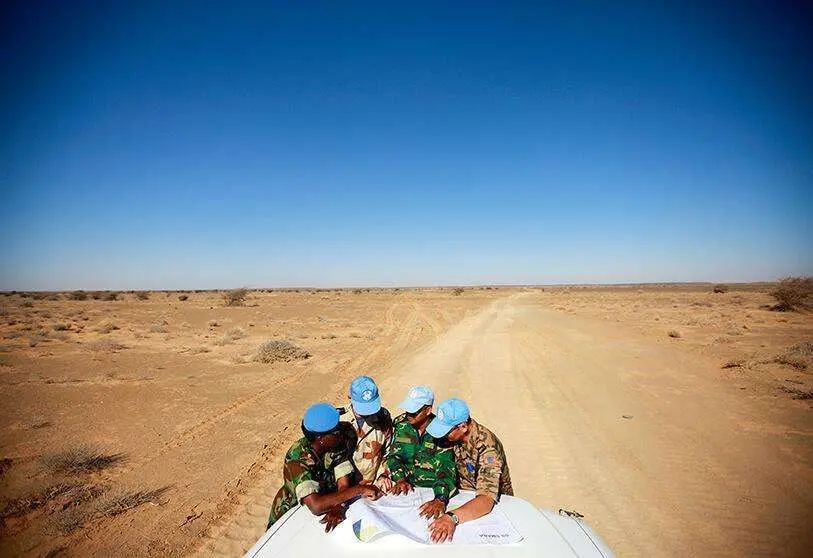Comunicado del Fórum Canario Saharaui sobre la renovación del mandato de la MINURSO

COMMUNIQUÉ FORUM CANARIO SAHARAUI
Following the adoption this Thursday by the UN Security Council of resolution 2654 on the question of the Sahara, which extends the mandate of MINURSO for one year, until the end of October 2023, this Canary Saharawi Forum declares:
That this resolution increases even more, almost irreversibly, the pre-eminence, credibility and seriousness of the Moroccan initiative for autonomy as the only solution to this regional dispute. This is something that has been happening with the successive annual resolutions of this Council since 2007, although this year with even greater emphasis, as the text includes a more reproachful tone towards certain attitudes of the Polisario.
These reprobations are directly related to the Council's request to humanitarian organisations to ensure that the delivery of humanitarian aid is carried out in accordance with UN good practices, and to stress this demand in order to stop the diversion of such aid by the Polisario and the Algerian Red Crescent. This diversion has been confirmed in several reports by the High Commissioner for Refugees, the European Union's anti-fraud office (OLAF) and numerous NGOs.
The resolution also calls for every effort to be made to register the populations of the Tindouf camps through the Office of the High Commissioner for Refugees. A request insistently refused by Algeria and the Polisario for more than 25 years. A refusal to census the population which aims to hide the real population, whose current data are estimates and are "inflated" by the Polisario, because the diverted humanitarian aid referred to by the Security Council is granted on the basis of population data. The more population, the more aid; the more aid, the more diversion and thus the more corruption.
Both issues, the diversion of humanitarian aid and the census, have been constantly denounced by this Saharawi Canarian Forum for years in different articles and communiqués. These denunciations were made to the Security Council itself in October, in a letter sent to its president, during our participation in the IV UN Commission in New York on this issue. We are pleased that our complaints have not fallen on deaf ears and that the UN has finally taken up such a sensitive and important issue.
We also understand that this new resolution reaffirms the constant position of the Security Council, and through it of the international community, that the solution to this regional conflict must be political, realistic, pragmatic, sustainable and based on compromise. In this regard, more than 90 countries now support the Moroccan autonomy initiative, as well as the opening by 30 other countries of consulates general in the cities of Laayoune and Dakhla. And the support of 11 EU countries, the last to join Belgium a few days ago.
On the other hand, the Council also calls on Algeria, as a party linked to this conflict, to develop and set out its position on the issue in order to move towards a solution to this dispute. In other words, it should stop looking the other way officially, saying that the Sahara issue does not concern them, but then, when a country like Spain takes an official position, they organise a diplomatic conflict over the issue. This is undoubtedly a highly reprehensible double standard.
In this regard, we support the statements made by the Moroccan Foreign Ministry in relation to the resolution, in which it refers to this issue by stating that "it is above all a matter of confirming the framework of the political process, since the Security Council considered (in preamble No. 4 of the resolution) that the format of the round tables is the only framework for discussion with a view to reaching a definitive solution to the regional dispute over the Sahara". The ministry also recalls that this format facilitates the political process, citing the example of the two round tables held in Geneva in December 2018 and March 2019 respectively.
Finally, point 8 of the resolution explicitly asked the Polisario to allow "the resumption of the safe and regular resupply of MINURSO in order to ensure the viability of the Mission's presence". In this line, the Security Council condemns the continued violations of the cease-fire by the Polisario, in contrast to the constant cooperation of the Kingdom with the UN mission.
In short, this month of October has witnessed internal dissension within the Polisario through the denunciation by the Polisario youth in its official media (something unheard of), calling for an urgent generational renewal. We have also witnessed the Polisario's official acknowledgement for the first time in five decades, and in the mouth of Brahim Ghali himself, of human rights violations against its own population throughout its history. We also observed how, contrary to what is claimed, the legal cases against Ghali himself continue with their procedural course (Madrid and Zaragoza). And to end the month, we witnessed the full-blown slap in the face that the content of this UN Security Council resolution has meant for the Polisario. We can undoubtedly conclude that October 2022 has been one of the darkest months in its history. The reasons for this are plain to see.








